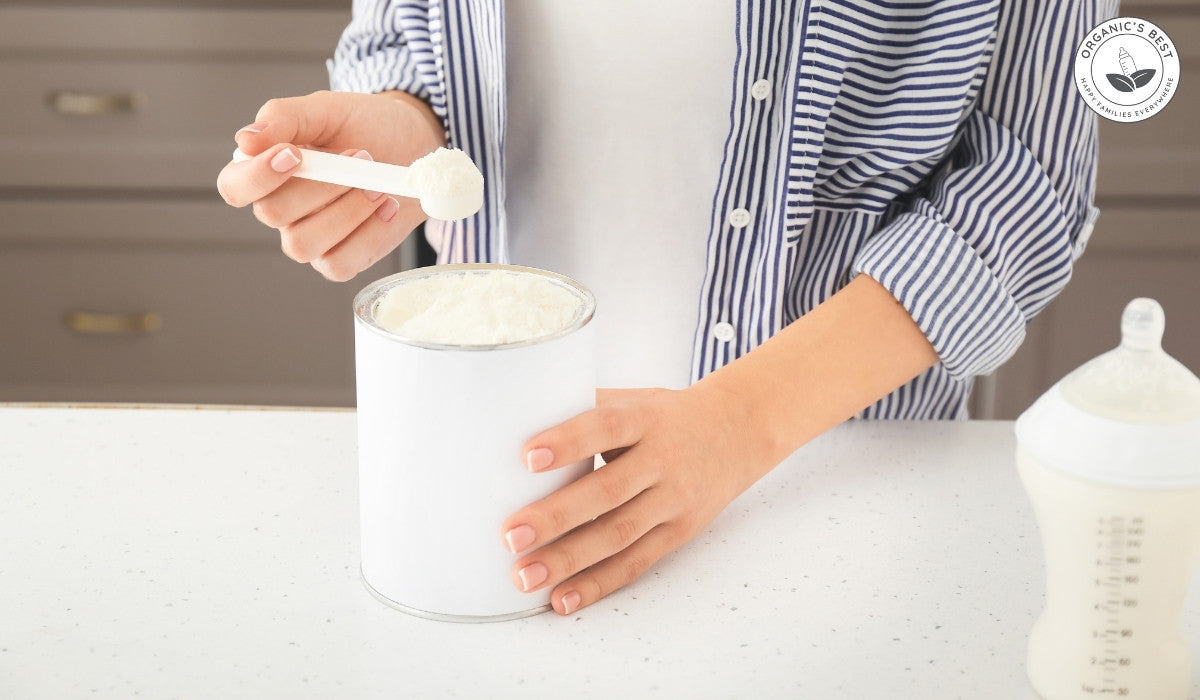Click to Get 2 FREE Boxes/Cans
Click to Get 2 FREE Boxes/Cans
Only New Customers! Click HERE to Get 2 Extra Boxes/Cans for Free With Your First Order.
Only New Customers! Click HERE to Get 2 Extra Boxes/Cans for Free With Your First Order.
BABY FORMULA
Offering new parents top-quality European infant formula from renowned brands like HiPP, Holle, Kendamil, and more. If you’re uncertain about which product to choose, our Formula Finder can help you make the best decision for your baby.
Baby Food
Offering new parents a premium selection of European baby foods, including jars, pouches, cereals, and snacks from esteemed brands like HiPP and Holle.
Does Formula Expire: What to Know About Expired Formula
by Agustina Fernandez July 30, 2024 6 min read

For parents who are new to formula feeding, there can be a bit of a learning curve when it comes to using infant formula safely. One of the natural curiosities that arises for parents is whether formula expires or not.
Well, the short answer is yes. It absolutely does! But as with many aspects of formula feeding, there's more to the story than meets the eye. So, if you're unaware of the importance of the expiration date on formula or what happens if baby drinks spoiled formula milk, then this article is for you.
Keep reading to uncover the differences between the baby formula expiration date and baby formula shelf life after opening. We also provide essential insights into what to do if baby drank old formula and symptoms to watch out for. Finally, we'll equip you with some creative ideas for using expired formula to help you minimize your waste.
Table of Contents
- Formula Expiration Date: Why is it Important?
- How Long Does Baby Formula Powder Last Once Opened?
- Shelf Life After Opening: Our Long Shelf Life Powdered European Formulas
- What Happens if Baby Drinks Old Formula?
- What Does Spoiled Formula Look Like?
- Storage Tips for Keeping Baby Formula Fresh
- What to Do With Expired Baby Formula
- Answering Your Questions About Expired Formula Powder
Formula Expiration Date: Why is it Important?

The expiration date is important because if you use formula past this point, you're jeopardizing your baby's health. All infant formula containers are labelled with an expiration date, which tells consumers how long a sealed and safely stored container of formula is good until.
A common question we receive is: how long does formula last unopened? In most cases, baby formula's shelf life ranges between 18 months and 2 years, depending on the brand and type of formula. For example, powdered baby formula lasts longer than liquid formula.
To find the expiration, look for the words "Use By" followed by a date. This is usually printed on the bottom of the box or can, typically next to the production batch number of the formula.
To avoid confusion, it's important to note that the expiration date format will differ depending on whether you use an American or European formula.
The standardized date format in Europe is DD/MM/YYYY, while expiration dates are commonly written as MM/DD/YYYY in the United States and Canada.
It's critical to always check this date before feeding your baby. Beyond the expiration date, the nutrient content and quality of the formula cannot be guaranteed. Moreover, there could be harmful microbiological activity. Thus, it's essential to throw away expired baby formula and never feed it to your little one!
How Long Does Baby Formula Powder Last Once Opened?
When parents first begin formula feeding, many are unaware that the shelf life of baby formula after opening the container is shorter than the infant formula expiration date.
That means once you've opened your powdered baby formula container, you typically have between 2 to 4 weeks to use it up.
However, these are merely general trends in shelf life. You should always read and follow the manufacturer's instructions for your baby's specific infant formula and abide by the container's expiration date.
Shelf Life After Opening: Our Long Shelf Life Powdered European Formulas
The shelf life of baby formula will vary between brands depending on the nutrients used in the formulation and the manufacturing process. Another area of distinction is that European organic formulas may need to be used before the 30-day shelf life typical of American formulas.
As for the brands that we offer here at Organic's Best, here is a quick breakdown of their shelf lives after opening:

Kendamil: 4 weeks
Nannycare: 4 weeks
Jovie Goat: 4 weeks
Jovie Cow: 3 weeks
HiPP: 3 weeks
Holle Dutch: 3 Weeks
Holle German: 2 weeks
Lebenswert Bio: 2 weeks
Löwenzahn Organics: 2 weeks
HiPP Ready-to-Feed: 24 hours
If you only use infant formula for supplementing, you likely go through containers of formula more slowly. In this case, we recommend opting for brands that give you more leeway in terms of how long you have to use up the formula after opening, like Kendamil, Nannycare, or Jovie Goat, which last for a whole month after they've been opened!
For the expiration dates of our sealed powdered formulas, we guarantee a shelf life of at least 6 months or more in the future. This allows parents to stock up on their baby's formula and take advantage of our bulk pricing deals without having to worry about their supply going off before they get to use it.
What Happens if Baby Drinks Old Formula?
Remember, expired baby formula loses its nutritional value and spoils. That means if you accidentally gave baby old formula, they could experience gastrointestinal upset and general discomfort.
If your baby has drank spoiled formula, it's essential to seek medical attention immediately, especially in the case of fever.
See our list below for potential symptoms of baby drinking spoiled formula.
Watch for These Symptoms if Baby Drinks Spoiled Formula

• Diarrhea
• Vomiting
• Stomach cramps
• Fussiness
• Abdominal swelling
• Poor appetite
• Fever
Keep in mind that even if your baby drank spoiled formula, they may not exhibit the symptoms listed above. However, it's still critical to contact your pediatrician.
What Does Spoiled Formula Look Like?
If you suspect that your baby's formula has gone off, you can rely on your senses to answer the question: What does expired formula look like?

Check for any unusual or foul smells, such as a moldy, sour, or chemical scent. There may also be changes in consistency, like clumping when mixing. Finally, you may also observe changes in color or the presence of mold or pests/insects in more extreme cases.
If you detect any of these signs of spoilage, it's important to throw the infant formula away.
Storage Tips for Keeping Baby Formula Fresh
The best way to prevent early baby formula expiration is to make sure you're following safe storage practices. That means keeping your baby's formula in a cool, dry indoor space, such as your pantry, and closing the container tightly after each use. It's also essential to store baby formula away from heat, humidity, and direct sunlight, all of which can cause the formula to go rancid before the expiry date.
What to Do With Expired Baby Formula
By now, you know that using expired baby formula to feed your little one is a big no-no, and when in doubt, throw it out! But before you toss it in the trash, we have some creative expired formula uses for you to try out.
To all our green-thumb readers, you'll be pleased to know that expired baby formula may be used as a gardening fertilizer, as compost for your plants, or as an organic pest repellent. Sometimes, animal shelters also accept donations of expired baby formula so long as it's not too far past the expiry.

Answering Your Questions About Expired Formula Powder
For those of you short on time who need quick answers or if you simply enjoy a concise summary to help you digest information, here are some Q and A's covering the key points about when does formula expire and what to do with expired formula!
Does Baby Formula Expire if Unopened?
As long as your infant formula is unopened, sealed, and stored properly, it should keep until the "Use By" date on the container. However, if it has been stored in unsafe conditions or was improperly sealed, the formula may spoil.
Can You Use Expired Formula?
Sometimes, in emergency circumstances such as the 2022 formula shortage, parents wonder: Can I use expired formula or is expired formula safe? The answer is a resounding no! The nutrients in infant formula can degrade past the expiry date, potentially offering your baby an insufficient amount of calories, and harmful bacteria can grow with time.
Can I Save Formula that Baby Didn't Finish?
No, it is not safe to save leftover formula after feeding your baby for later use. The reason for this is that saliva from your baby's mouth enters the bottle and can lead the the growth of dangerous bacteria.
So if your baby doesn't finish their bottle, don't be tempted to store it in the fridge and heat it up for later; the safest thing you can do is simply throw it away.
|
Disclaimer:
Please be aware that this information is based on general trends in babies, and it is not medical advice. Your doctor should be your first source of information and advice when considering any changes to your child’s formula and when choosing your child’s formula. Always consult your pediatrician before making any decisions about your child’s diet or if you notice any changes in your child. Breastfeeding is the best nutrition for your baby because breast milk provides your child with all the essential nutrients they need for growth and development. Please consult your pediatrician if your child requires supplemental feeding. |
Agustina Fernandez
Dr. Agustina Fernandez earned her medical degree from the prestigious Universidad Nacional de Córdoba, Argentina. With a deep-rooted passion for pediatrics, Dr. Fernandez is currently on the path to specializing in children's healthcare. Recently, she has delved into the vital field of infant nutrition. Her research interests include breastfeeding, infant formula, and baby food in little ones’ formative years. Dr. Fernandez's commitment to this area of study underscores her dedication to ensuring the health and well-being of children from their earliest days.
Leave a comment
Comments will be approved before showing up.
Also in Organic Infant Nutrition and Health Blog

10 Winter Activities for Kids and Toddlers
by Agustina Fernandez January 06, 2026 8 min read
Read More
How to Choose The Best Infant Formula: A Guide to EU Organic Formulas
by Agustina Fernandez January 05, 2026 14 min read
Read More
Best Formula for Breastfed Babies 2026 Guide
by Agustina Fernandez January 05, 2026 15 min read
Read More
Reviewed by Dr. Po-Chang Hsu, MD, MS
-

Dr. Po-Chang Hsu: Medical Reviewer of Organic's Best Blog
Dr. Hsu received his medical degree from Tufts University in Boston, Massachusetts, and holds a Master’s of Science degree from both Harvard University and Tufts University.
